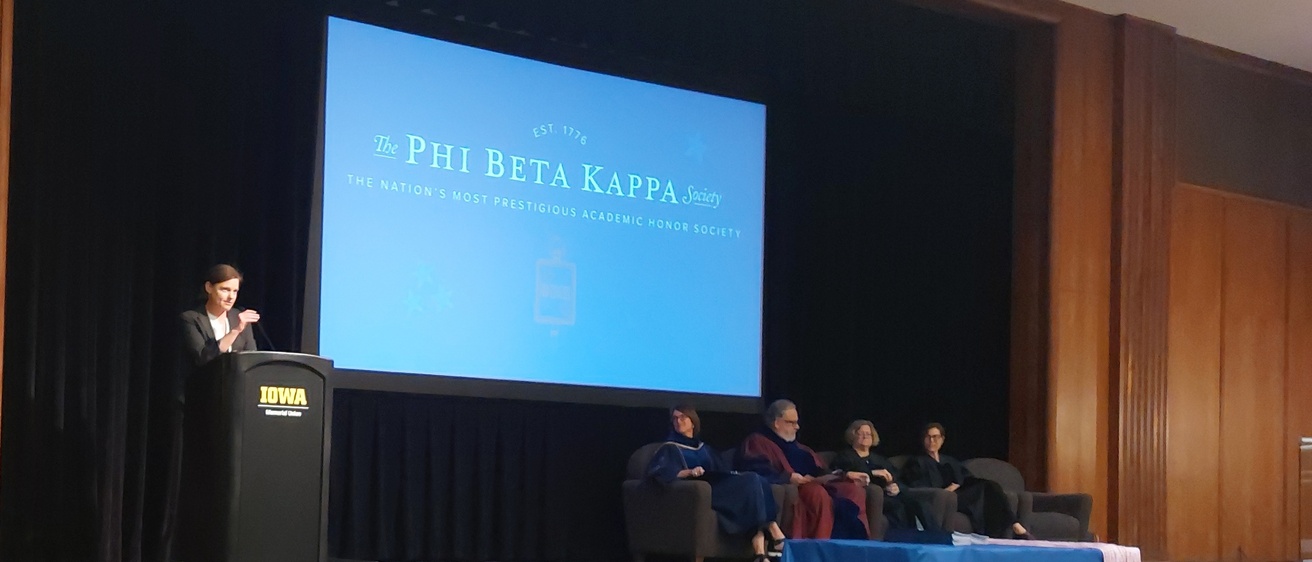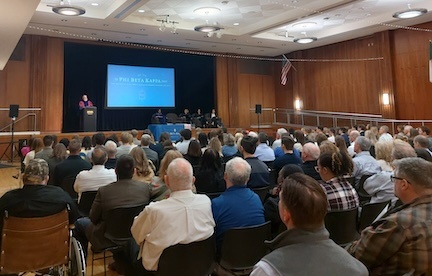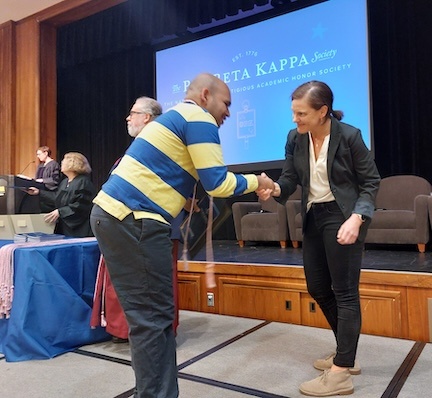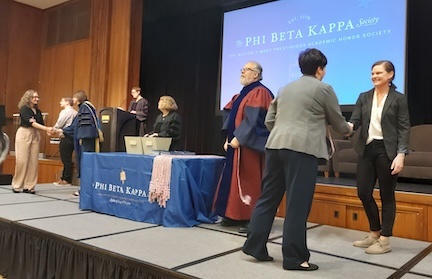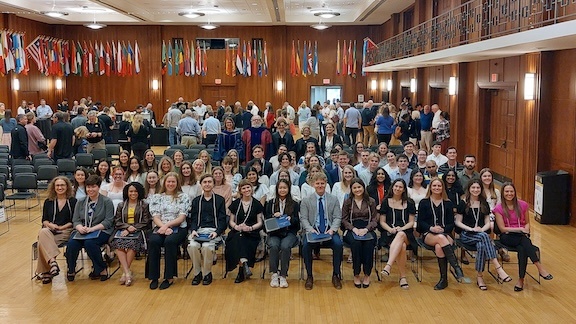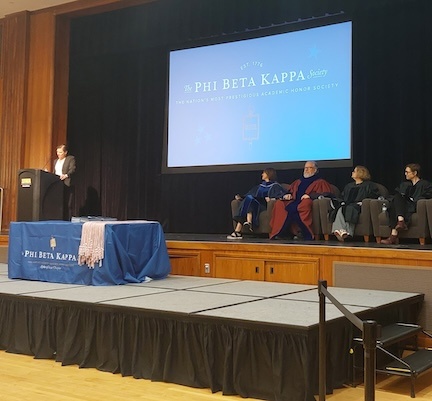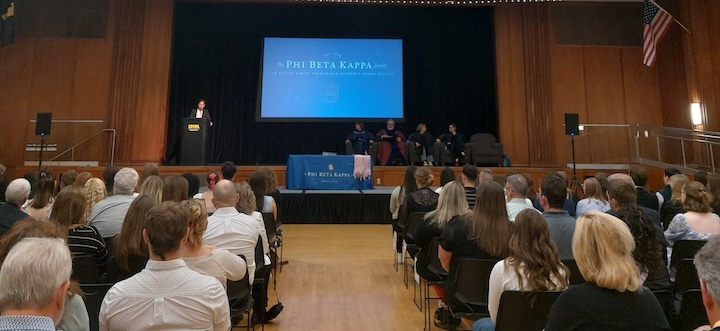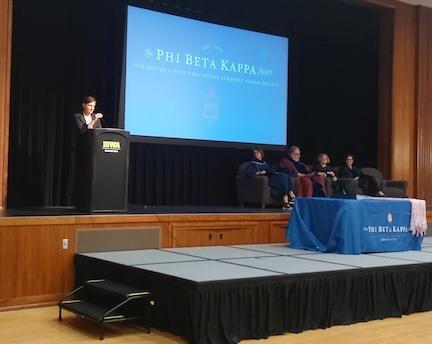I want to start with a parable from a commencement speech by the late author, David Foster Wallace:
There are these two young fish swimming along, and they happen to meet an older fish swimming the other way, who nods at them and says, “Morning. How’s the water?” And the two young fish swim on for a bit, and then eventually one of them looks over at the other and goes, “What the hell is water?”
This story is about how we often live on autopilot, with our self at the center of the world, without noticing the currents in the world around us. The current is both so obvious and so invisible. We can get so used to our routines and pulled in the tides of social media that we forget we have the power to choose how we think and live. The older fish understands this, but the younger fish don’t realize it yet.
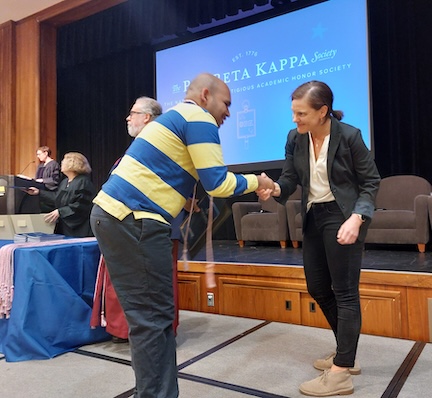
The message of his commencement speech that follows — which I love — is that at its best a liberal arts education empowers us to observe the world with curiosity and to ask why, empowers us to be aware that other people have different perspectives because you’ve learned how to ask questions to understand and not just to respond. You’ve learned how to turn that understanding into a choice of how to think and how to live.
But if you told me this as a young kid, that school is about learning how to ask questions, I would not have believed you, I might have even laughed. My first experiences in early education were where teachers were mostly annoyed about all my questions. I even got a minus minus (yes double minus!) in self-control because I raised my hand too much. Well the double minus was probably from the frustration of not getting called on and eventually I stopped raising my hand altogether, while still asking questions.
Fortunately, after finishing high school I was still excited for college because that would be my chance to play college tennis. I ended up at the University of Illinois in Urbana-Champaign. I explored a lot of schools and mostly looked at how I fit with the tennis team but not much of academics. At that time as a first-generation college student, I still thought college was about answering the teacher’s questions but I wasn’t too interested in that, instead I wanted to get out of a classroom and major in photography. But my parents weren’t too interested in that. I started as a Kinesiology major, what is health and human physiology here. To my surprise in my first classes I learned college was about coming up with your own questions, and less even about answering your questions completely, and more about answering them enough to find the next important question. Professors often taught from a place of curiosity and told stories about what they learned in their research, and they were excited to talk with me about what I was curious about.
As you could imagine, I was in heaven! And through all my questions I learned that I could even ask and answer questions for a living as a professor in college. In my first psychology class that I got to design and run experiments in, I fell in love with it, and still remember the excitement of writing my TA from the computer lab in my dorm room about changing my major. It was late at night but I was so excited about finding psychology and neuroscience that I couldn’t sleep and I just had to share. But, there was a problem. I did not understand the world of academia and higher level education. My parents worked in sales and banking, solid careers that provided for our family, supported my junior tennis and my brother going to Northwestern to study engineering. But the idea of a career in research was not a water I had ever swam in. I felt like a fish out of water in science.
Then came another roadblock (or so I first thought) which was a life threatening staph infection my junior year, which I got after surgery from a tennis injury. I took a semester off which coincidentally meant I had to do a fifth year of college, and without full-time tennis I could dive into research. I was fortunate enough to meet a professor through tennis that understood my lack of research experience as a senior and took me on for honors research, that was my first mentor Brent Roberts.
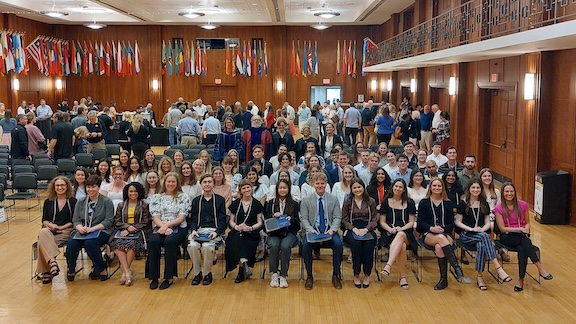
It was my honors research with Brent where I first felt the feeling of what it meant to do a research project from scratch. Because he would arrange his day between research, teaching, and playing tennis, I also felt like I was seeing a version of “professor” that I could relate to. I got to spend a whole year reading and designing a study, completing the IRB application, scheduling participants and collecting data, analyzing the data, and writing the results into a paper that would be my honors thesis and eventually a published paper. In case you’re wondering what my project was about, it was on how personality is related to our health behaviors and health. For example were extraversion and openness to experience generally traits associated with exercise and fitness, or was feeling extraverted and open in situations relevant to physical activities, such as exercise and sports, more important? (It was more the latter)
Ultimately the experience in Brent Robert’s lab inspired me to pursue research for a career. But, I had so many questions and wasn’t sure where to focus. Brent encouraged me to take a year off to work in a lab to explore more research areas. He felt strongly the research questions I’m asking should keep me up at night and I hadn’t found that. So I did what I advise students to do now too, and that is read about research happening at our school and other places and email professors to see if they are hiring for staff positions. That led me to Art Kramer’s lab at Illinois.
Art’s lab was in the middle of a research study on how physical exercise that improves fitness could slow brain aging and improve cognition and learning in older adults. As an athlete I had been fascinated with how we learn new skills with practice, and why that works well sometimes and not others, and why some people were better at learning new skills than others, but I didn’t know a thing about how it happened in the brain. Though I was curious. This was my chance to learn and even choose what was next to learn! I got the job to be a lab manager and with each day I realized I found these were the problems that would keep me up at night. If we understood how to keep learning at any age, getting older could be exciting until our very last days and what a world that would be to live in. I eventually went to graduate school in Art’s lab, and he was my PhD mentor.
I LOVED graduate school (capital L-O-V-E-D). But I still felt like a fish out of water. It was difficult to explain what I was doing with my family, to whom research felt like a black box with an unclear health insurance plan. What WAS I doing anyway and where would this lead?
I had a partner who is still my partner now, and we got married my first year of graduate school. Could I have a family? What made all the difference at this point in my path was both Art’s confidence in me and seeing the women in my department. Monica Fabiani, Kara Federmeier, and Diane Beck are just a few of these women. You hear it all the time but I think because there’s so much truth: when you can see it you can believe it. The more you can see the more you can believe. Me and the women in my graduate program organized a monthly lunch with women faculty and would ask questions to hear their stories of what life in academia was like as a woman with a family. It was re-assuring to learn there is no one way to do it, and even if you are working long hours some weeks you do have choice in when you work those hours.
I also remember seeing a new faculty member start her lab from an empty room. I saw an empty room (because I cleaned it out, it was one of Art’s old lab rooms), and I asked her wow where do you even start? Are you nervous, what’s next? She looked at me as if the room was not empty, she saw the room filled already and walked me through all her plans. Where the lab manager would sit, where graduate students would do their research, where they would meet for journal club to discuss new papers and plan their research . That’s when I realized that yes I felt like a fish out of water, but I did understand that look in her eye of love for her research and a vision for a lab. Therefore I could do this.
We all deserve to get that look in our eye. Whatever your next step, don’t let the fear of the unknown stop you from pursuing a problem that keeps you up at night. If you haven’t found that problem, keep asking questions and be curious. Be open to the possibility of being genuinely changed. And when you need reminding, this is water.
I also hope it’s clear how much my path was shaped by seeing other people bring their whole self to work, and in that I could see a part of myself in them. By seeing Brent squeeze in tennis between meetings and teaching (and he also had young kids at the time), and hearing how different women juggled their family and research and teaching, I could see a place for each part of me in academia. Whatever your path, I hope this for you, and also wish you the courage to bring your whole self to work to inspire the next generation.
So what did my path look like to get here at Iowa? My last year of graduate school I had my first child, and in my mind dedicated that year only to my dissertation. But when I was pregnant a job opening popped up for the University of Iowa, and it was perfect for me. They were looking for someone focusing on brain aging and lifestyle interventions such as physical activity, to slow brain and cognitive aging. The job ad fit me so well I had to apply. Well as you can see it worked out. I finished my PhD, got my own empty room, and the Health, Brain, and Cognition Lab was born 8 months after my son.
People often ask, but how did you do that? I can’t imagine juggling it all at once. I can best explain with a story by Anne Lamott in her book "Bird by Bird." She wrote:
Thirty years ago my older brother, who was ten years old at the time, was trying to get a report on birds written that he'd had three months to write, which was due the next day. We were out at our family cabin in Bolinas, and he was at the kitchen table close to tears, surrounded by binder paper and pencils and unopened books on birds, immobilized by the hugeness of the task ahead. Then my father sat down beside him, put his arm around my brother's shoulder, and said, 'Bird by bird, buddy. Just take it bird by bird’.
I still live by this story, I read this story once a week if not more. After making time for zooming out to get the birds-eye view, bird watching if you will, and choosing what is most important, then I zoom back in and try to put goals and ideas into action by taking it bird by bird.
To briefly explain the research in my lab, let’s go back to the fish parable. We talked about water as the culture we live in—something we're often unaware of because we're so immersed in it. As neuroscientists Dr’s György Buzsaki and David Tingley put it, let’s imagine “the body is for the brain as the water is for the fish.” The brain and body are so connected that we often don’t realize how much the body shapes our thoughts and emotions. Taking the outside perspective—like the older, more experienced fish—we can start to see how much the body influences how we think and feel. This idea might not be surprising—think about how a whole day of sitting inside staring at screens can leave you irritable and perhaps impulsive to quick fixes that make you feel good. In our lab, we study how to flip this around for our own good, how physical activity could improve our focus and well-being by boosting blood flow to the brain and activating our brain’s own growth and repair systems to function better. In turn, clearer thinking helps us make better decisions about health behaviors now that will pay off for our long-term health. The takeaway is that just like we can shape the culture we live in, we can also shape how our bodies support our brains to be at their personal best, through the choices we make.
Before I end, a comment on the feelings of instability and paralysis for planning much of anything right now. What will happen to academia and the arts and will science survive the massive cuts and metaphorical earthquakes happening in our infrastructure for research and evidence based medicine? All we can do is focus on what resources we have right now and do the best job we can with the information we have so that when we have to pivot, we can pivot on the strongest foot possible. Sometimes pivoting may feel like going in circles, especially right now when things are changing quickly and unexpectedly, but if we can somehow learn and understand more as we go, the ground each time around is new ground, and the circle turns into an upward spiral instead of a merry go round or disappearing in a downward spiral.
So, you may be wondering, what would the older fish say to the two younger fish right now?
“The currents are tugging at your attention, pulling you in different directions—uncertainty, fear, division, and change. But remember, the water isn’t the world itself, it’s just the current.
In times like these, it’s more important than ever to stay curious and ask questions. Don’t let the flow of things sweep you away on autopilot.
Remind yourself, 'this is water' 'this is water' through questions, big or small. What do I want to contribute to the world? What’s shaping my thinking right now? And in doing that, you create your own current. You steer, even if just a little, bird by bird, and even small ripples can make big change.”
Thank you.
I wish you hope—
perhaps an empty room filled with vision—
and most of all,
that look in your eyes we all deserve to feel.
